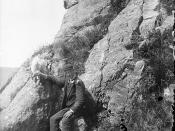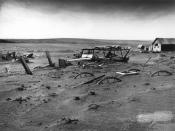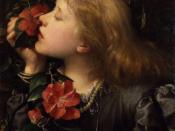Ross infuses irony into the last page of "The Lamp At Noon" to convey the fatality of the single-minded. Set in the era of the Great Depression, Ross's short story emphasizes one couple's conflicting attitudes regarding the best interests of their child. Paul, a proud and obstinate farmer raised on family soil, is convinced that his son should grow up feeling the same pride which comes from owning the land. His obsession with ownership and independence so completely dominates his thoughts that he cannot perceive the hopelessness of remaining in the perpetual dust storm that ravages his farm. Ignorant to the damage that the dust inflicts upon his family's physical and emotional health, Paul metaphorically chains his wife and son to an existence without a future. Ellen, on the other hand, is determined to provide her son with the vain luxuries that she enjoyed in her childhood. Unable to comprehend the satisfaction of self-sufficiency, she insists that Paul get a job in town working under someone else's command.
Ellen and Paul's inability to acknowledge the merits of the other's dreams or accept their own perceptional flaws causes their relationship to disintegrate. Desperate to get away from the hopelessness of a stagnant farm, Ellen takes their baby and flees into the heart of the storm: "But nearly two hours later, it was himself who came upon her. Crouched down against a drift of sand as if for shelter, her hair in matted strands around her neck and face, the child clasped tightly in her hands." Ellen's attempt to find shelter in "a drift of sand" clearly demonstrates that she too, is blind to the futility of her struggles. She is so obsessed with the dream of a town life for her child that she overlooks the foolishness in seeking...



G e
good effort. Sounds interesting...
4 out of 4 people found this comment useful.